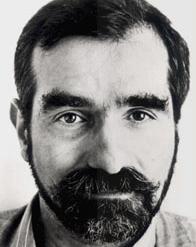
*
17.11.1942, Queens / New York (City), USA
Regisseur * 1960-66 Studium der Filmwissenschaften [film
communications] an der New York University (1966 MA /Master of Arts/) - dort
auch Dozent * bereits während des Studiums dreht preisgekrönte Kurzfilme
(u.a. What's a Nice Girl Like You Doing in a Place Like This ?,
1963; It's Not Just You, Murray, 1964)
* 1965/68 inszeniert seinen ersten Spielfilm (autobiografische Charakterstudie)
* 1973 erster Erfolg (bei der Kritik) mit Mean Streets
- Beginn einer erfolgreichen Zusammenarbeit mit Robert De Niro
* 1975 Durchbruch mit Taxi Driver * 1988 löst mit The
Last Temptation of Christ Proteste religiöser Fundamentalisten
aus * seit 1990 auch als Produzent tätig * 1998 Jury-Vorsitzender der
Filmfestspiele in Cannes * neben Spielfilmen dreht auch mehrere Dokumentationen
(Italianamerican, 1974; The Last Waltz,
1976; American Boy: A Profile of Steven Prince, 1977/78; Shine a Light, 2008),
Werbefilme und video clips (1987 Bad mit Michael
Jackson) * gelegentliche Auftritte (meist cameos) als Schauspieler
* 2006 unterschreibt Vier-Jahres-Vertrag (als Regisseur und Produzent)
bei Paramount (Pictures) * gilt als einer der wichtigsten Regisseure des
New Hollywood * Engagement für die Erhaltung des filmischen Kulturerbes
- 1992 Gründung der Firma Martin Scorsese Presents (Restaurierung und
Verleih/Vertrieb von Filmklassikern) sowie Gründungsmitglied der Film
Foundation (1990) * verheiratet mit Isabella Rossellini
(3. Ehefrau, 1979-82)
FILMS
Who's
That Knocking at My Door (Who's That Knocking at My Door ?, 1965/68-USA)
Drama mit Harvey Keitel
# Boxcar Bertha (Die Faust der Rebellen, 1971-USA) (7206)
# Mean Streets (Hexenkessel, 1972/73-USA) (11-01; 7310)
Alice Doesn't Live Here Anymore (Alice lebt
hier nicht mehr, 1974-USA) Drama mit Ellen Burstyn, K. Kristofferson
Taxi Driver (Taxi Driver, 1975-USA
* R: MS, B: Paul Schrader, K: Michael Chapman, M: Bernard Herrmann, D:
Robert De Niro, Cybill Shepherd, Jodie Foster, Albert Brooks, Harvey Keitel,
Leonard Harris, Peter Boyle) 113m-Thrillerdrama
New York New York (New York, New York,
1976/77-USA) Musical/drama mit Liza Minnelli, Robert De Niro
Raging Bull (Wie ein
wilder Stier, 1979-USA; R: MS, B: Paul Schrader, Mardik
Martin, K: Michael Chapman, D: Robert De Niro, Cathy Moriarty, Joe Pesci)
128m-Boxerdrama /Buch von Jake La Motta;
Joseph Carter, Peter Savage/
# The King of Comedy (The King of Comedy, 1981-USA) (0302)
# After Hours (Die Zeit nach Mitternacht, 1984-USA) (8509)
The Color of Money
(Die Farbe des Geldes, 1986-USA) Spielerdrama mit Paul Newman,
Tom Cruise
The Last Temptation of Christ
(Die letzte Versuchung Christi, 1987-USA/CDN; R: MS,
B: Paul Schrader, K: Michael Ballhaus, M: Peter Gabriel, D: Willem Dafoe,
Harvey Keitel, Barbara Hershey) 164m-Psychodrama /Roman
von Nikos Kazantzakis/
New York Stories (New Yorker Geschichten,
1988-USA) Episode(nfilm) Life Lessons mit Nick
Nolte, R.Arquette
GoodFellas (GoodFellas
- Drei Jahrzehnte in der Mafia, 1989-USA) Gangsterepos
mit Robert De Niro, R. Liotta
Cape Fear (Kap der
Angst, 1991-USA) Psychothriller mit Robert De Niro, Nick Nolte,
Jessica Lange, Juliette Lewis
The Age of Innocence (Zeit der Unschuld,
1992-USA) Liebesdrama mit Daniel Day-Lewis, Michelle Pfeiffer
# Casino (Casino, 1994/95-USA; R: MS, B: Nicholas Pileggi, Martin Scorsese, K: Robert Richardson, D: Robert De Niro, Sharon Stone, Joe Pesci) 178m-Thriller (Buch von Nicholas Pileggi) (9511)
# Kundun (Kundun, 1996-USA) (9712)
# Bringing Out the Dead (Bringing Out the Dead - Nächte der Erinnerung, 1998/99-USA) (Roman von Joe Connelly) (9910)
Gangs of New York (Gangs of New York,
2000/01-USA) Krimidrama mit Leonardo
DiCaprio, Daniel Day-Lewis
# The Aviator (Aviator, 2003-USA) (0412)
# The Departed (Departed - Unter Feinden, 2005-USA; R: MS, B: William Monahan, K: Michael Ballhaus, M: Howard Shore, D: Leonardo DiCaprio, Matt Damon, Jack Nicholson, Mark Wahlberg) 151m-Thrillerdrama (0610)
# Shutter Island (2008-USA) (Roman von Dennis Lehane) (1002)
# Hugo (Hugo Cabret, 2010-USA; R: Martin Scorsese, B: John Logan, K: Robert Richardson, M: Howard Shore, D: Ben Kingsley: Georges Méliès * Sacha Baron Cohen: Station Inspector Gustav * Asa Butterfield: Hugo Cabret * Chloe Grace Moretz: Isabelle) 126m-Abenteuerdrama (Buch von Brian Selznick, 2007) (06-?; 1111)
# The Wolf of Wall Street (2012/13-USA) (Buch von Jordan Belfort) (1312)
# Silence (Silence, 2015-USA/RC/MEX; R: Martin Scorsese, B: Jay Cocks, Martin Scorsese, K: Rodrigo Prieto, M: Kim Allen Kluge & Kathryn Kluge, D: Andrew Garfield: Sebastião Rodrigues ° Adam Driver: Francisco Garupe, Tadanobu Asano: Dolmetscher, Ciarán Hinds: Pater Alessandro Valignano & Liam Neeson: Pater Cristóvão Ferreira) 161m-Historiendrama (Roman Chinmoku von Shūsaku Endō, 1966) (01-05; 1612)
# The Irishman (The Irishman, 2017/18-USA; R: Martin Scorsese, B: Steven Zaillian, K: Rodrigo Prieto, M: Robbie Robertson, D: Robert De Niro: Frank Sheeran ° Al Pacino: Jimmy Hoffa ° Joe Pesci: Russell Bufalino, Bobby Cannavale: "Skinny Razor", Harvey Keitel: Angelo Bruno, Stephen Graham: Anthony "Tony Pro" Provenzano & Kathrine Narducci: Carrie Bufalino & Domenick Lombardozzi: Fat Tony Salerno) 209m-Biopic (Buch I Heard You Paint Houses von Charles Brandt, 2004) (09-03; 1911)
# Killers of the Flower Moon (Killers of the Flower Moon, 2021-USA; R: Martin Scorsese, B: Eric Roth, Martin Scorsese, K: Rodrigo Prieto, M: Robbie Robertson, D: Leonardo DiCaprio: Ernest Burkhart ° Robert De Niro: William Hale ° Lily Gladstone: Mollie Burkhart) 206m-Krimidrama (Buch von David Grann, 2017) (04-10; 2310)
AWARDS
Goldene
Palme für Taxi Driver [Filmfestspiele Cannes
1976]
Regiepreis für After Hours [Filmfestspiele
Cannes 1986]
Los Angeles Film Critics Association Award für GoodFellas
(beste Regie, 1990)
New York Film Critics Circle Award für GoodFellas
(beste Regie, 1990)
Silberner Löwe (beste Regie) für GoodFellas
[Filmfestspiele Venedig 1990]
British Academy (BAFTA) Awards für GoodFellas
(Regie+Drehbuch+Produktion, 1991)
National Board of Review Award für The Age of Innocence
(beste Regie, 1993)
Goldener Löwe (für sein Lebenswerk) [Filmfestspiele Venedig 1995]
Life Achievement Award [American Film Institute 1997]
Billy Wilder Award [National Board of Review 1998]
Lifetime Achievement Award [London Critics Circle 1998]
Ehren-César (2000)
Spezial David /di Donatello/ (2001)
Golden Globe für Gangs of New York (beste
Regie, 2003)
Lifetime Achievement Award [Directors Guild of America 2003]
Grand Prix Special des Amériques [Filmfestival Montreal 2003]
London Critics Circle Film Award (Regisseur des Jahres) für The Aviator (2005)
National Board of Review Award (beste Regie) für The Departed (2006)
New York Film Critics Circle Award (beste Regie) für The Departed (2006)
Academy Award / Oscar (beste Regie) für The Departed (2007)
Golden Globe für The Departed (beste Regie,
2007)
Cecil B. DeMille Award [Golden Globes 2010]
Goldener
Ehrenbär [Berlinale 2024]
BOOKS
Martin
Scorsese: Mes plaisirs de cinéphile: textes, entretiens,
filmographie complète. Paris: Cahiers du cinéma, 1998
David Ehrenstein: The Scorsese Picture: The Art and Life of Martin
Scorsese. New York: Carol, 1992
Les Keyser: Martin Scorsese. New York: Twayne, 1992
Marie Katheryn Connelly: Martin Scorsese: An Analysis of His Feature
Films, with a Filmography of His Entire Directorial Career. Jefferson/London:
McFarland, 1993
Lesley Stern: The Scorsese Connection. London/Bloomington: British
Film Institute/Indiana University Press, '95
David Thompson, Ian Christie [Hg.]: Scorsese on Scorsese. London:
Faber and Faber, 1996
+ Scorsese über Scorsese. Frankfurt/Main: Verlag der Autoren,
1996
Lawrence S. Friedman: The Cinema of Martin Scorsese. Oxford:
Roundhouse Publishing, 1997
Andy Dougan: Martin Scorsese: The Making of His Movies. New York: Thunder's Mouth Press,
1998 [Close-Up Series]
+ Martin Scorsese: Nahaufnahme. Reinbek: Rowohlt, 1998
Peter Brunette [Hg.]: Martin Scorsese: Interviews. Jackson: University
Press of Mississippi, 1999
José Enrique Monterde: Martin Scorsese. Madrid: Catedra, 2000
Leighton Grist: The Films of Martin Scorsese, 1963-77: Authorship
and Context. Basingstoke/London: Macmillan, 2000
Elio Lucantonio: Martin Scorsese. Roma: Dino Audino Editore, 2003 > 111 S.
René Marx: Martin Scorsese : regards sur la trahison. [Paris]:
H. Berger, 2003
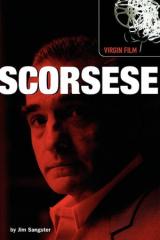 Jim Sangster: Scorsese. London: Virgin Books, 2002
Jim Sangster: Scorsese. London: Virgin Books, 2002Scorsese is one of the most widely respected film directors of the last thirty years. GoodFellas, Raging Bull and The Last Temptation of Christ are titles familiar to us all. This extensive analysis discusses his influences, the controversy surrounding his films and includes exhaustive music lists and details of his long-time collaborators. Completely up to date, with details of Scorsese's new film, Gangs of New York, which stars Cameron Diaz and Leonardo DiCaprio. Illustrated, with eight pages of color film stills. > 296 p.; [8] plates. bibliog. index
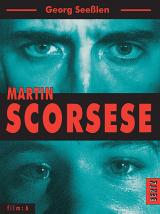 Georg Seeßlen: Martin Scorsese. Berlin: Bertz + Fischer, 2003 [Reihe film > Band 6]
Georg Seeßlen: Martin Scorsese. Berlin: Bertz + Fischer, 2003 [Reihe film > Band 6]Martin Scorsese ist der bedeutendste Regisseur des heutigen amerikanischen Films. Seit nunmehr dreißig Jahren dreht er sowohl künstlerisch wie kommerziell erfolgreiche Filme – darunter Meisterwerke wie TAXI DRIVER, WIE EIN WILDER STIER, GOODFELLAS, KAP DER ANGST, ZEIT DER UNSCHULD und zuletzt GANGS OF NEW YORK. Jetzt liegt endlich eine umfassende Würdigung seines Werks vor: Georg Seeßlen, einer der angesehensten deutschsprachigen Filmpublizisten, analysiert Scorseses Werk Film für Film. Dabei fahndet er nach wiederkehrenden Motiven, charakterisiert »den« Scorsese-Helden, verfolgt die Spur der oft blutigen Gewalttätigkeit und arbeitet doch immer die Eigenarten des jeweiligen Films – sei es CASINO oder KUNDUN – präzise heraus. In einem großen, werkübergreifenden Essay beschreibt er Scorseses einzigartige Filmsprache und versucht, seinen Platz in der Filmgeschichte zu bestimmen. Die insgesamt 1.063 Fotos und Bildsequenzen aus den Filmen ergänzen diesen fundierten Text auf anschauliche Weise. > 576 Seiten / 16 Seiten in Farbe, Hardcover
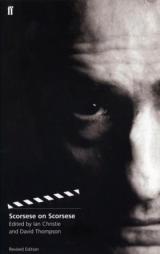 Ian Christie, David Thompson [Hg.]: Scorsese on Scorsese. London: Faber & Faber, 2003
Ian Christie, David Thompson [Hg.]: Scorsese on Scorsese. London: Faber & Faber, 2003Now fully updated, Scorsese on Scorsese is the definitive study of America’s foremost film director, including new chapters on Kundun, Bringing Out the Dead, the documentary My Voyage to Italy, and the epic Gangs of New York. True to its title, this book offers Martin Scorsese in his own words: through a career-length interview in which he recalls his upbringing in New York’s Little Italy, and explains the inspiration and creation of his many great movies. The result is an incomparable insight into a body of work that is the most personal achievement in modern American cinema. Scorsese proves himself to be a terrifically articulate artist, whether recounting the many battles to get his movies made, his supreme passion for the medium of film itself, or the roots of his long-time creative partnership with actor Robert De Niro. Scorsese on Scorsese also contains a complete filmography, and a wealth of behind-the-scenes stills and sketches from Scorsese's own collection. > Paperback, 352 pages
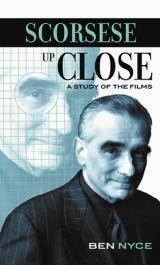 Ben Nyce: Scorsese Up Close: A Study of the Films. Lanham/Oxford: Scarecrow Press, 2004
Ben Nyce: Scorsese Up Close: A Study of the Films. Lanham/Oxford: Scarecrow Press, 2004Unlike other books on Martin Scorsese that favor the discussion of broad themes and plot summaries, Scorsese Up Close: A Study of the Films also looks at the cinematic text of the great director's films. With a scrutiny comparable to the detail Scorsese brings to the shooting and editing process, author Ben Nyce examines particular shots or sequences of shots in many of the director's works. By focusing on these key components, Nyce explains how the visual and aural elements of such scenes dramatize Scorsese's singular vision. Nyce first discusses several of the early works that established Scorsese as a filmmaker, beginning with a short student film, What's a Nice Girl Like You Doing in a Place Like This? Subsequent chapters focus on individual films in the Scorsese canon, including Mean Streets, The Last Temptation of Christ, The Age of Innocence, Bringing out the Dead, Taxi Driver, and Raging Bull. Nyce's close attention to the details within each of these films will satisfy fans and students alike, especially those who share a passion for Scorsese's artistry and an appreciation for the craft of his filmmaking. Illustrated with photos. > xvi, 176 p.; illus. notes. bibliog. index. * Filmmakers series (no.105)
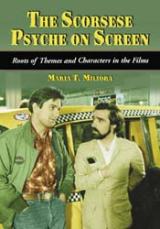 Maria T. Miliora: The Scorsese Psyche on Screen: Roots of Themes and Characters in the Films. Jefferson/London: McFarland, 2004
Maria T. Miliora: The Scorsese Psyche on Screen: Roots of Themes and Characters in the Films. Jefferson/London: McFarland, 2004This study examines the life and work of acclaimed film director Martin Scorsese, showing that his films reflect his experiences growing up in a Sicilian-American-Catholic family in the tough neighborhood of New York’s Little Italy. The study links the personal Scorsese, his roots, and his ethical and religious attitudes. The work examines many films from Boxcar Bertha (1972) to Bringing out the Dead (1999), with special attention given to Gangs of New York (2002) as a vehicle for Scorsese’s return to his roots. The Last Temptation of Christ (1988) is analyzed as a template for the Scorsese opus. The study begins with a biography of Scorsese, and then describes his films from 1963 to 2002, providing plot summaries, themes, and characters. The body of the work analyzes films in terms of male sexuality, narcissism, violence, and the place of women in the director’s personal and cinematic world. In addition to showing how the themes of Scorsese’s films derive from his roots, the study offers psychological analyses of his focal characters. It provides a psychological basis for understanding the dialogue and actions of the characters in the context of their respective film stories. The study shows that Scorsese’s films express the values that define his worldview, which include his attitudes about masculinity, aggression, and violence. > ix, 211 p.; illus. filmog. notes. bibliog. index.
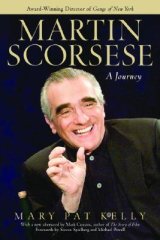 Mary Pat Kelly: Martin Scorsese: A Journey. [?]: Da Capo Press, 2004 > 3rd Edition
Mary Pat Kelly: Martin Scorsese: A Journey. [?]: Da Capo Press, 2004 > 3rd EditionScorsese's life and work are presented through interviews with the director as well as more than twenty major celebrity figures, providing a rare look at the process and inspiration behind the films of America's premier director. Martin Scorsese: A Journey features exclusive movie stills and on-location photographs and interviews with more than twenty major film stars, including forewords by Steven Spielberg and Michael Powell. The author provides the reader with insights into Scorsese's imagination and influences, and his relationships with his family and colleagues. This updated edition also explores such directorial works as Kundun, Bringing Out the Dead, and the much-talked-about Gangs of New York. An updated chronology, filmography, and index are included. > 322 pages
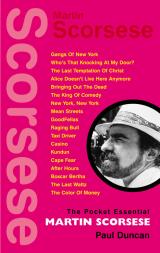 Paul Duncan: Martin Scorsese. Harpenden: Pocket Essentials, 2004 > Pocket Essential series
Paul Duncan: Martin Scorsese. Harpenden: Pocket Essentials, 2004 > Pocket Essential seriesScorsese examines what men do when they are in conflict with themselves. Taxi Driver Travis Bickle is disgusted by the mean streets and wants to wash them clean. After all, what was the point of him going to Vietnam if it wasn't to make things better? Self-destructive Jake La Motta unleashes the Raging Bull within him both inside and outside the boxing ring. Wiseguy Henry Hill thinks that he can be one of the GoodFellas, but he eventually realises that there is nothing good or wise about a life of organised crime. There is more to Scorsese's work than crime and violence. His characters are trying to attain some kind of spiritual peace with society, their family and themselves. In the end they try to make a decision they can live with. In Kundun, the Dalai Lama leaves Tibet. In The Last Temptation Of Christ, Jesus forgoes a normal family life to fulfil his destiny. In The Age Of Innocence, Newland Archer decides to be a hypocrite within society rather than truthful outside of it. In Mean Streets, Charlie must choose whether to keep his volatile friend Johnny Boy and his epileptic lover, or to propel himself up the ladder of success. Hailed as America's greatest living film director, Martin Scorsese is an innovative storyteller at the height of his intellectual and emotional powers. This Pocket Essential examines his life and work. > 156 p.; bibliog.
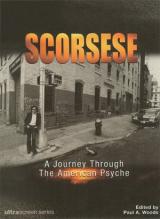 Paul A. Woods [Hg.]: Scorsese: A Journey through the American Psyche. London: Plexus, 2005 > Ultrascreen Series
Paul A. Woods [Hg.]: Scorsese: A Journey through the American Psyche. London: Plexus, 2005 > Ultrascreen SeriesMartin Scorsese: A Journey Through The American Psyche collects the best articles, interviews and reviews in one unique anthology to reveal Scorsese as an unrivalled storyteller and visual stylist, who has consistently tackled controversial material, exploring alienation, crime and the war-path of the urban male ego. First stunning audiences with Mean Streets, starring Robert de Niro, their further collaborations produced classics including Taxi Driver, Raging Bull, Goodfellas, and Casino. While best known for these, Scorsese has made a huge variety of films, and this anthology covers every single one, providing a thorough assessment of one of modern cinema’s masters. ‘Ultrascreen’ film series. > 288 p.; illus. filmog.
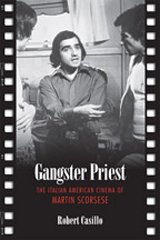 Robert Casillo: Gangster Priest: The Italian American Cinema of Martin Scorsese. Toronto/Buffalo/London: University of Toronto Press, 2006
Robert Casillo: Gangster Priest: The Italian American Cinema of Martin Scorsese. Toronto/Buffalo/London: University of Toronto Press, 2006Widely acclaimed as America's greatest living film director, Martin Scorsese is also, some argue, the pre-eminent Italian American artist. Although he has treated various subjects in over three decades, his most sustained filmmaking and the core of his achievement consists of five films on Italian American subjects - Who's That Knocking at My Door?, Mean Streets, Raging Bull, GoodFellas, and Casino - as well as the documentary Italianamerican. In Gangster Priest Robert Casillo examines these films in the context of the society, religion, culture, and history of Southern Italy, from which the majority of Italian Americans, including Scorsese, derive. Casillo argues that these films cannot be fully appreciated either thematically or formally without understanding the various facets of Italian American ethnicity, as well as the nature of Italian American cinema and the difficulties facing assimilating third-generation artists. Forming a unified whole, Scorsese's Italian American films offer what Casillo views as a prolonged meditation on the immigrant experience, the relationship between Italian America and Southern Italy, the conflicts between the ethnic generations, and the formation and development of Italian American ethnicity (and thus identity) on American soil through the generations. Raised as a Catholic and deeply imbued with Catholic values, Scorsese also deals with certain forms of Southern Italian vernacular religion, which have left their imprint not only on Scorsese himself but also on the spiritually tormented characters of his Italian American films. Casillo also shows how Scorsese interrogates the Southern Italian code of masculine honour in his exploration of the Italian American underworld or Mafia, and through his implicitly Catholic optic, discloses its thoroughgoing and longstanding opposition to Christianity. Bringing a wealth of scholarship and insight into Scorsese's work, Casillo's study will captivate readers interested in the director's magisterial artistry, the rich social history of Southern Italy, Italian American ethnicity, and the sociology and history of the Mafia in both Sicily and the United States. > 590 pages
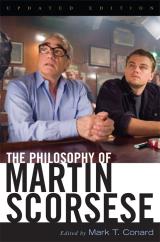 Mark T. Conard [Hg.]: The Philosophy of Martin Scorsese. Lexington: The University Press of Kentucky, 2007
Mark T. Conard [Hg.]: The Philosophy of Martin Scorsese. Lexington: The University Press of Kentucky, 2007In The Philosophy of Martin Scorsese, an impressive cast of contributors explores the complex themes and philosophical underpinnings of Martin Scorsese's films. One of the most significant filmmakers in the history of American cinema, Scorsese is the creative force behind films such as GoodFellas, Taxi Driver, The Last Temptation of Christ, The Aviator, and The Age of Innocence. The contributing authors use Scorsese's films as vehicles for exploration of philosophical concepts such as friendship and egoism, vigilantism, libertarianism, Buddhist ethics, desire and self-restraint, madness, the criminal mind, beatitude and unhappiness, and the absurd. > 256 p.; notes. index.
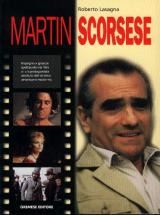 Roberto Lasagna: Martin Scorsese. Roma: Gremese Editore, 2007
Roberto Lasagna: Martin Scorsese. Roma: Gremese Editore, 2007Analizzando tutta la produzione del regista statunitense (dai primi cortometraggi a Taxi Driver, da Toro scatenato al più recente trionfo con Gangs of New York), il volume ne evidenzia l’intima coerenza di fondo e i temi ricorrenti da oltre trent’anni. Per ogni pellicola, vengono proposti accurati approfondimenti critici e appropriati contributi fotografici. Grazie anche al supporto di una dettagliata filmografia e di puntuali riferimenti bibliografici, il libro rappresenta la più completa escursione nell’opera di un grande protagonista del “New American Cinema”. L’Autore è saggista e critico cinematografico (per riviste specializzate quali «Panoramiche» e «Duel») e ha pubblicato studi e monografie per diverse case editrici > 144 pagine con 100 foto in b/n
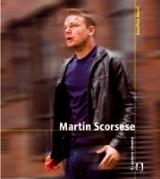 Serafino Murri: Martin Scorsese. Milano: Il Castoro, 2007
Serafino Murri: Martin Scorsese. Milano: Il Castoro, 2007Nasce a Flushing, N.Y., nel 1942. Un occhio al cinema europeo e l'altro alla produzione indipendente americana. Tra i suoi capolavori: Taxi driver (1976), Toro scatenato (1980), Quei bravi ragazzi (1990), L'età dell'innocenza (1993), The Departed - Il bene e il male (2006) > 200 pagine
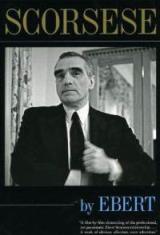 Roger Ebert: Scorsese by Ebert. Chicago/London: University of Chicago Press, 2008
Roger Ebert: Scorsese by Ebert. Chicago/London: University of Chicago Press, 2008Roger Ebert wrote the first film review that director Martin Scorsese ever received — for 1967’s I Call First, later renamed Who’s That Knocking at My Door — creating a lasting bond that made him one of Scorsese’s most appreciative and perceptive commentators. Scorsese by Ebert offers the first record of America’s most respected film critic’s engagement with the works of America’s greatest living director, chronicling every single feature film in Scorsese’s considerable oeuvre, from his aforementioned debut to his 2008 release, the Rolling Stones documentary Shine a Light. In the course of eleven interviews done over almost forty years, the book also includes Scorsese’s own insights on both his accomplishments and disappointments. Ebert has also written and included six new reconsiderations of the director’s less commented upon films, as well as a substantial introduction that provides a framework for understanding both Scorsese and his profound impact on American cinema. > xvi, 299 p.; index.
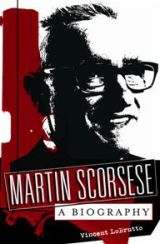 Vincent LoBrutto: Martin Scorsese: A Biography. Westport: Praeger Publishers, 2008
Vincent LoBrutto: Martin Scorsese: A Biography. Westport: Praeger Publishers, 2008Martin Scorsese's current position in the international film community is unrivaled, and his name has become synonymous with the highest standards of filmmaking excellence. He is widely considered America's best living film director, and his Taxi Driver and Raging Bull appear frequently on worldwide surveys of the best films of all time. Here, in the first biographical account of this artist's life, Vincent LoBrutto traces Scorsese's Italian-American heritage, his strict Catholic upbringing, the continuing role of religion in his life and art, his obsessive love of cinema history, and the powerful impact that the streets of New York City had on his personal life and his professional career. Meanwhile, the filmmaker's humble, soft-spoken public persona tells only part of the story, and LoBrutto will delve into the other side of a complex and often tortured personality. Scorsese's intense passion, his private relationships, his stormy marriages, and his battles with drugs and depression are all chronicled here, and, in many cases, for the first time. In addition, the book includes an interview with the director, as well as filmographies cataloging his work as a director, producer, actor, and presenter. As his Best Director award at the 2007 Oscars clearly demonstrated, Scorsese has become something like Hollywood royalty in recent years, finally enjoying the insider status and favor that eluded him for most of his career. But these recent developments aside, Scorsese is also notable as a distinctly American type of artist, one whose work-created in a medium largely controlled by commercialism and marketing-has always been unmistakably his own, and who thus remains a touchstone of artistic integrity in American cinema. In Martin Scorsese: A Biography, readers can examine not only the work of one of the form's genuine artists, but also the forces that have propelled the man behind it. > 464 pages
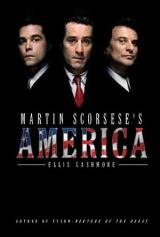 Ellis Cashmore: Martin Scorsese's America. Cambridge/Malden, MA.: Polity Press, 2009
Ellis Cashmore: Martin Scorsese's America. Cambridge/Malden, MA.: Polity Press, 2009For over four decades, Martin Scorsese has been the chronicler of an obsessive society, where material possessions and physical comfort are valued, where the pursuit of individual improvement is rewarded and where male prerogative is respected and preserved. Scorsese has often described his films as sociology and he has a point: his storytelling condenses complex information into comprehensible narratives about society. In this sense, he has been a guide through a dark world of nineteenth century crypto-fascism to a fetishistic twentieth century in which goods, fame, money and power are held to have magical power. Author of Tyson: Nurture of the Beast and Beckham, Ellis Cashmore turns his attention to arguably the most influential living film-maker to explore how Scorsese envisions America. Greed, manhood, the city and romantic love feature on Scorsese's landscape of secular materialism. They are among the themes Cashmore argues have driven and inform Scorsese's work. This is America, as seen through the eyes of Martin Scorsese and it is a deeply unpleasant place. Cashmore's book discloses how, collectively, Scorsese's films present an image of America. It's an image assembled from the perspectives of obsessive people, whether burned-out paramedics, compulsive entrepreneurs, tortured lovers, or celebrity-fixated comedians. It's collected from pool halls, taxicabs, boxing rings and jazz clubs. It's an image that's specific, yet ubiquitous. It is Martin Scorsese's America. > 304 p.; illus. filmog. bibliog. index.
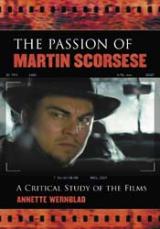 Annette Wernblad: The Passion of Martin Scorsese: A Critical Study of the Films. Jefferson, NC/London: McFarland, 2011
Annette Wernblad: The Passion of Martin Scorsese: A Critical Study of the Films. Jefferson, NC/London: McFarland, 2011From his earliest shorts to his recent feature films The Departed and Shutter Island, this book offers an in-depth analysis of the deepest archetypal themes, symbols, and structures in Martin Scorsese’s entire body of work. It examines each of Scorsese’s films as a mythological journey through which the main character is offered an opportunity for psychological and spiritual enlightenment, focusing especially on how each character is led to recognize, accept, and embrace his or her flawed traits. The book also explores the ways in which Scorsese’s films incite extreme reactions and strike deep chords within his viewers, particularly by speaking the language of the unconscious and forcing readers to examine their own hidden flaws. > x, 257 p.; illus. filmog. notes. bibliog. index.
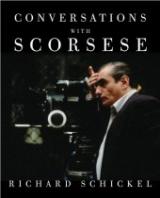 Richard Schickel: Conversations with Scorsese. New York: Alfred A. Knopf, 2011
Richard Schickel: Conversations with Scorsese. New York: Alfred A. Knopf, 2011Mean Streets, Taxi Driver, Raging Bull, The Last Temptation of Christ, Kundun, The Departed, The Aviator, Shutter Island: these are just a few of the critically acclaimed films, startling experimental works, and spectacular commercial blockbusters with which Martin Scorsese has forever enriched American cinema. Here is a rare and wonderfully insightful chance to experience all of these films, and the history and process of moviemaking in general, through the words and wit of the master director. Richard Schickel’s canny and intelligent interviews guide us through Scorsese’s life and work, from the child who escaped the realities of Little Italy in the 1950s through movies to the man whose increasingly encyclopedic knowledge of film shaped his ambitions and art. Scorsese reveals which films are most autobiographical and which have been forays into unknown territory in content or aesthetics. He talks about his lesser-known movies, those already considered classics, his documentaries, and his influences. He explains his personal style, the close attention he pays to detail, and his attraction to genre films. And he discusses what being a lifelong student of film has taught him about acting, directing, music, and camerawork, among many other topics. The result is a vivid, immensely enlightening history of modern Hollywood seen through the eyes of one intrepid filmmaker. We see audiences’ expectations tested by what Scorsese was willing to put on the screen in explorations of prostitution, institutionalized violence, and religion. We see the unavoidable frustrations and exhilarating rewards of filming live concerts for The Band and at Woodstock. And we see many of the rewarding artistic and personal relationships of Scorsese’s career, including collaborations with Robert De Niro, Harvey Keitel, Jack Nicholson, and Leonardo DiCaprio. An invaluable appreciation of one of our most admired film directors. > xiv, 423 p.; illus. filmog. index.